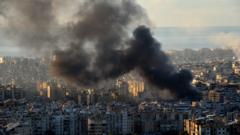US President Joe Biden has announced a ceasefire agreement between Israel and Hezbollah, ending 13 months of fighting along the Lebanese-Israeli border. The ceasefire is set to take effect at 04:00 local time, with the aim of creating a “permanent cessation of hostilities.”
The conflict, which began after Hamas’s October 7, 2023 attack on southern Israel, has been Lebanon’s deadliest in decades, resulting in over 3,823 deaths and displacing one million residents. Hezbollah began firing rockets into Israel a day after the Hamas attack, escalating tensions in the region.
Under the US-brokered deal, there will be a 60-day period during which Israel will gradually withdraw its troops from southern Lebanon. The Lebanese government will regain control of areas currently held by Hezbollah, with the expectation that Hezbollah fighters and weapons will be removed from the area south of the Litani River.
Israeli Prime Minister Benjamin Netanyahu emphasized that Israel will not hesitate to strike if Hezbollah breaks any part of the agreement. “If Hezbollah violates the agreement and tries to arm itself, we will attack,” he stated. The deal is expected to allow Israel to focus on what Netanyahu calls “the Iranian threat” and potentially isolate Hamas.
The conflict has had significant impacts on both sides. Hezbollah has been severely weakened, with many of its leaders killed, including long-time chief Hassan Nasrallah and his presumed successor. The World Bank estimates $8.5 billion in economic losses and damage in Lebanon.
The United States and France, which will be involved in monitoring the implementation of the deal, hope the agreement will restore calm and allow residents to return safely to their homes. Biden confirmed that no US troops would be deployed to manage the ceasefire.
Lebanon’s Prime Minister Najib Mikati welcomed the ceasefire, calling it a “fundamental step towards restoring calm and stability.” However, he also demanded that Israel fully comply with the deal and withdraw from occupied sites.
The conflict has broader implications for the region. Hezbollah, more than just a militia, is a political party with significant support among Shia Muslims. Its opponents may see this as an opportunity to limit its influence, potentially leading to internal tensions.
Israel’s objectives include ensuring the safe return of approximately 60,000 residents from northern Israeli areas displaced by rocket attacks. Hezbollah attacks on Israel and the occupied Golan Heights have killed at least 75 people, more than half of them civilians.
While the ceasefire represents a significant diplomatic achievement, questions remain about long-term stability and the future of Hezbollah’s role in Lebanon. The deal provides a temporary respite, but the underlying tensions in the region persist.




